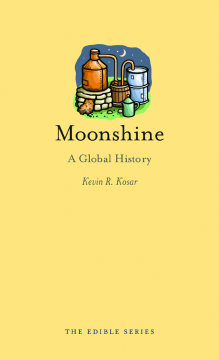
Additional Information
Book Details
Abstract
You might think moonshine only comes from ramshackle stills hidden away in the Appalachian Mountains, but the fact of the matter is we’ve been improvising spirits all around the world for centuries. No matter where you go, there is a local bootleg liquor, whether it’s bathtub gin, peatreek, or hjemmebrent. In this book, Kevin R. Kosar tells the colorful and, at times, blinding history of moonshine, a history that’s always been about the people: from crusading lawmen and clever tinkerers to sly smugglers and ruthless gangsters, from pontificating poets and mountain men to beleaguered day-laborers and foolhardy frat boys.
Kosar first surveys all the things we’ve made moonshine from, including grapes, grains, sugar, tree bark, horse milk, and much more. But despite the diversity of its possible ingredients, all moonshine has two characteristics: it is extremely alcoholic, and it is, in most places, illegal. Indeed, the history of DIY distilling is a history of criminality and the human ingenuity that has prevailed out of officials’ sights: from cleverly designed stills to the secret smuggling operations that got the goods to market. Kosar also highlights the dark side: completely unregulated, many moonshines are downright toxic and dangerous to drink. Spanning the centuries and the globe, this entertaining book will appeal to any food and drink lover who enjoys a little mischief.
“As Kosar documents in his excellent book, Moonshine: A Global History, governments from Ancient China to Ancient Mesopotamia have been defining which types of alcoholic drinks are legal, and therefore acceptable for people to drink, and which types of alcoholic drinks are illegal, and therefore unacceptable for people to drink . . . The book has much to offer to spirit enthusiasts. And, while I can’t imagine enjoying spirits made from carrots or horse milk, Kosar’s documentation of all sorts of exotic spirits is certainly interesting . . . An understanding of the history of moonshine has a great deal to teach modern political leaders.”
— Forbes
“A vibrant and entertaining new study of moonshine’s 600-year history . . . Kosar, an authority on booze and a director of alcohol policy at the R Street Institute in Washington, DC, discusses this aspect of his subject with pace, learning, insight, and good sense. He is convincing when he argues that ‘the more a government’s policies reduce access to affordable, safe, licit alcoholic drinks, the more it encourages the production of cheap, dangerous, illicit booze.’ And he is arresting when he links the production of moonshine to moments of political resistance. . . . But the book is at its most grimly arresting when Koshar describes the pernicious effects of the drink, and the extremes to which people will go to create and consume it.”
— Irish Times
“For spirits aficionados, history buffs, cooks, and fans of great writing, Moonshine is a must buy. It should be on everyone’s Father’s Day gift list.”
— Spectator
"Moonshine really is a worldwide phenomenon."
— Jeff Cioletti, Drinkable Globe
Kevin R. Kosar is a senior fellow at the R Street Institute thinktank in Washington, DC, where he directs its alcohol policy program. He is the author of Whiskey: A Global History, also published by Reaktion Books, and has edited and written for AlcoholReviews.com for nearly twenty years.
Table of Contents
| Section Title | Page | Action | Price |
|---|---|---|---|
| Cover | Cover | ||
| Moonshine: A Global History | 3 | ||
| Imprint Page | 4 | ||
| Contents | 5 | ||
| Introduction: Moonshine, Moonshine Everywhere | 7 | ||
| 1. The Basics | 13 | ||
| 2. Making Moonshine | 26 | ||
| 3. Moonshine and Politics: Enmity from the Start | 43 | ||
| 4. Moonshine Goes Pop (Twice) | 66 | ||
| 5. Moonshine and Very Bad Things | 84 | ||
| 6. Moonshine Goes Legit | 108 | ||
| Conclusion: Moonshine and Us | 124 | ||
| Recipes | 127 | ||
| Recommended Brands of Licit Moonshine | 131 | ||
| Select Bibliography | 132 | ||
| Websites and Associations | 134 | ||
| Acknowledgements | 136 | ||
| Photo Acknowledgements | 137 | ||
| Index | 138 |
